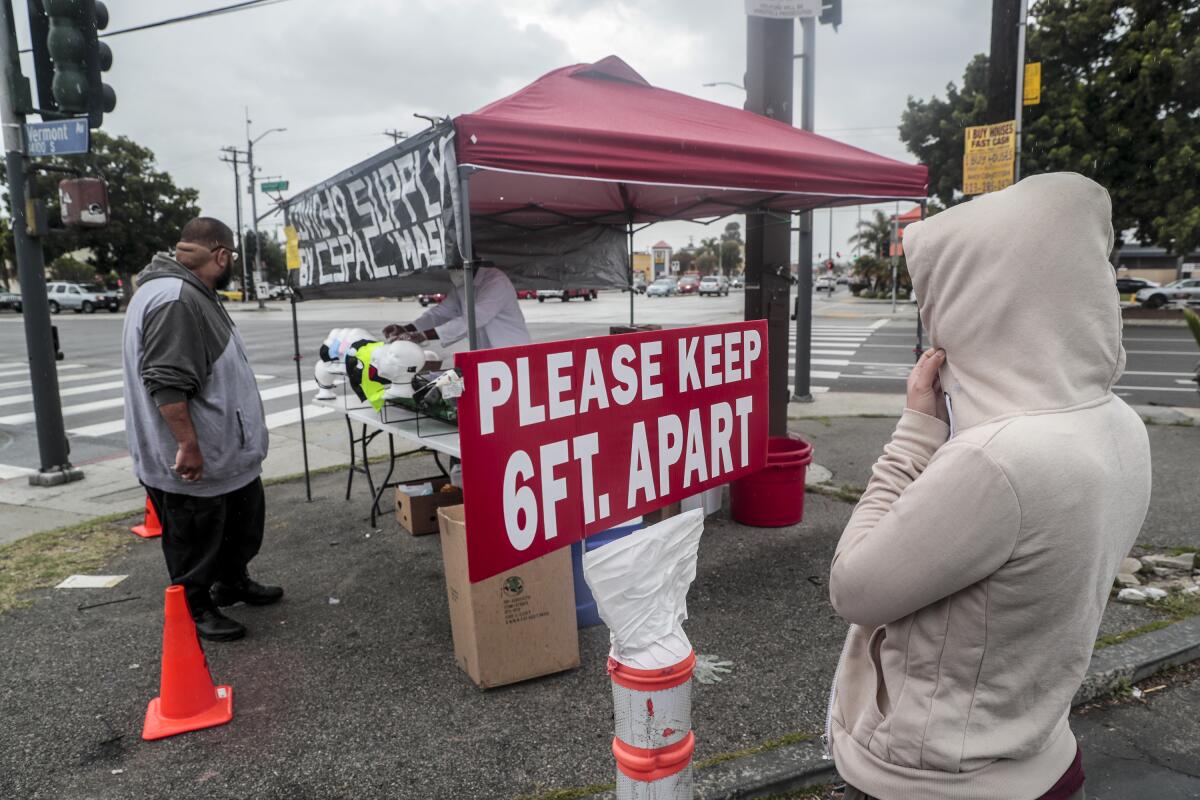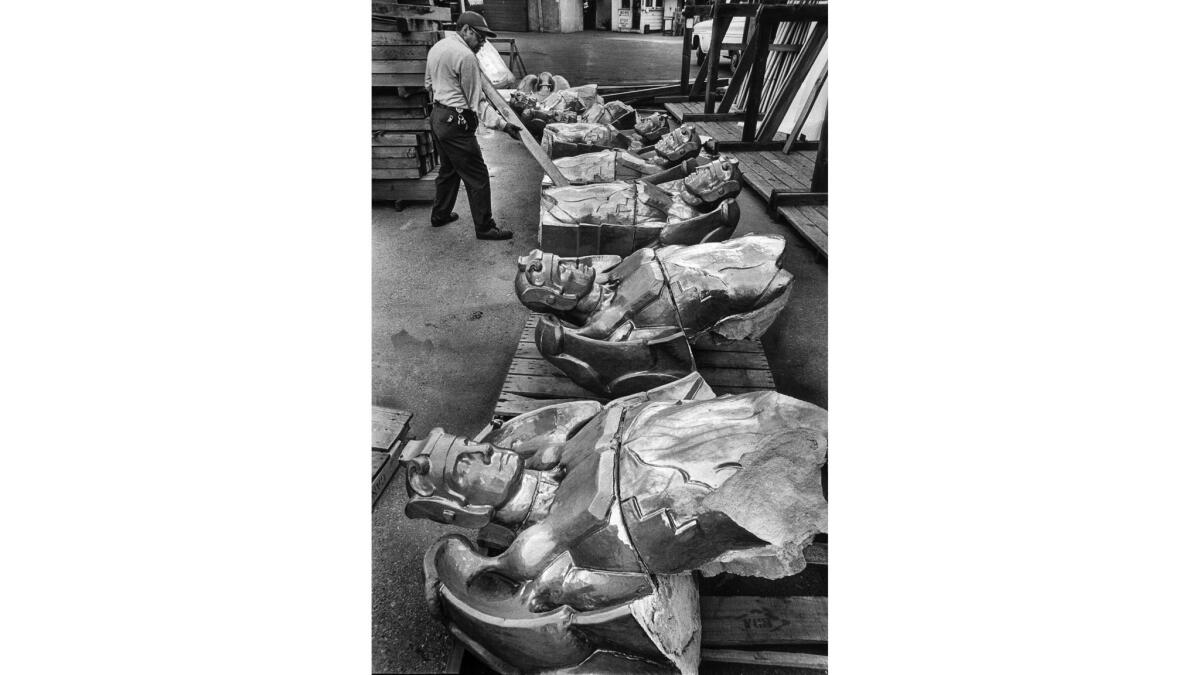Newsletter: Stay-at-home, here to stay a while

If you’re hoping for life to return to normal soon, health officials say it’s time to readjust your expectations.
TOP STORIES
Stay-at-Home, Here to Stay a While
California is beginning to see guarded progress in its fight against the coronavirus, with a slower spread in infections and the number of deaths lagging significantly behind those in hot spots such as Italy and New York. But California’s early successes, even as the number of fatalities rapidly rises, are unlikely to bring a quick return to normal life.
Health officials say weeks and probably months of major restrictions on movements and large gatherings are the only ways to prevent coronavirus cases from surging to unmanageable levels. The stay-at-home orders are ravaging the economy, leading to massive unemployment as many businesses have shuttered. But lifting the restrictions poses major health risks, and officials warn that we should expect another wave of cases as social distancing is eased.
Start your day right
Sign up for Essential California for the L.A. Times biggest news, features and recommendations in your inbox six days a week.
You may occasionally receive promotional content from the Los Angeles Times.
Nationwide, public health experts say information about the spread of the coronavirus through Texas and Florida in the coming days could be crucial in more accurately predicting how many Americans are likely to die from the pandemic.
The apparent effects of social distancing in Italy, New York and California have given scientists hope that the final U.S. death toll could be lower than White House projections of 100,000 to 240,000, which were based on a combination of models that administration officials have not fully explained. In New York, coronavirus-related deaths are now more than double the fatalities in the Sept. 11, 2001, terrorist attack.
Dr. Anthony Fauci, director of the National Institute of Allergy and Infectious Diseases, offered sobering predictions about the new normal, noting it’s unlikely the new coronavirus will ever be completely eradicated. There will be a gradual process by which society can begin to function again, but “if you want to get to pre-coronavirus, that might not ever happen in the sense of the fact that the threat is there.”
Where’s the U.S. Stockpile Going?
As the Trump administration depleted the national stockpile of medical supplies over the last month to fight the coronavirus, it sent hundreds of thousands of masks, respirators and other protective equipment to states with very small outbreaks, new records show.
That left medical workers in areas hit hardest by the pandemic, including New York, New Jersey, Michigan and Washington, hustling to find the supplies they needed with relatively little aid from the stockpile. Yet Hawaii, Montana and Nebraska, which each have had fewer than 500 recorded cases, each received more than 79,000 of the critically needed N95 masks.
Tracking the Ventilators
Earlier this week, California Gov. Gavin Newsom said he was lending 500 state-owned ventilators to New York and other coronavirus hot spots before the expected peak of cases in California hits next month. But his decision has caught some local officials off guard as they scramble to acquire the much-needed medical equipment.
Riverside County officials said the state recently denied their request for an additional 500 ventilators, even though the county expects demand for the breathing machines at county hospitals and medical centers to exceed the supply in less than three weeks. Santa Clara County, another area hard hit by the COVID-19 pandemic, is offering a $1,000 bounty for each device it receives and has ordered companies with the devices to report their inventory to the county.
More Top Coronavirus Headlines
— One hospital in Georgia is struggling to treat a community afflicted with one of the nation’s most intense outbreaks.
— Americans in communities with higher smog levels are at greater risk of dying from COVID-19, according to a new study.
— A new poll of Los Angeles County residents shows their deep anxiety about contracting COVID-19, the disease caused by the virus, and are worried about the financial costs of staying at home.
— From caviar to apple juice, coronavirus is changing the way the world feeds itself. And just in time for Easter, the price of eggs has jumped up because of a spike in demand.
— How is this night different from all other nights? Passover traditions have been disrupted.
Plus, here are some tips on getting through the days ahead. For more, sign up for Coronavirus Today, a special edition of The Times’ Health and Science newsletter. As with all our newsletters, it’s free:
— A virologist answers the questions you are too embarrassed to ask.
— Did someone tell you to use soap to clean your groceries? Don’t listen.
Bernie Bows Out
The Democrats have their candidate: Former Vice President Joe Biden is the last man standing after Sen. Bernie Sanders dropped out of the presidential race. Sanders’ anti-establishment campaign changed the course of Democratic politics and energized large groups of new voters but fell short of amassing a broad enough coalition to capture the nomination.
In an online address to supporters, Sanders said the pandemic precipitated his decision to suspend campaigning, but that he will remain on the ballot in an effort to push the party platform in a more progressive direction.
Biden moved quickly to reach out to Sanders’ supporters, but unifying the deeply fractured Democratic Party won’t necessarily be easy.
FROM THE ARCHIVES
The Richfield Building towered over Los Angeles for decades, and with it was an army of terra cotta angels. But in 1969, the building was demolished and after 40 years, the guards had nothing left to protect.
A wrecking crew saved the roughly 40 pieces, setting them up in a junkyard on East Washington Boulevard. A Los Angeles Times photographer captured the statues in their new home on April 9, 1969. Of course, it was a temporary one — they were later put up for sale for about $100 each. A 2010 Times story said one spent time in a man’s Santa Ana frontyard, where it was nicknamed the “Golden Boy,” before relocating to a Los Angeles loft apartment.

CALIFORNIA
— The state has launched a 14-day soft lockdown in its prisons because of the coronavirus and told exhausted prison nurses that if they’re ordered to work 16-hour shifts, they must comply or face reprisal.
— Nearly 100 residents are being removed from a nursing facility in Riverside County after more than a dozen employees missed work. There are nearly 40 confirmed coronavirus cases among patients and staff there.
— In Madera, friends and family paid their respects by car to a woman who died of coronavirus complications. She was apparently infected after attending a funeral.
— One mother and son struggling to make ends meet after she lost her job in L.A.’s South Bay have turned to selling masks on the street.
Enjoying this newsletter?
Subscribe to the Los Angeles Times.
NATION-WORLD
— A federal appeals court ruled that Texas can enforce its temporary ban on abortion because of the coronavirus pandemic. It’s a ruling that could quickly bring a pivotal abortion question before the Supreme Court.
— Israel’s ultra-Orthodox Jews are known for their big families, crowded living conditions and a bone-deep devotion to communal religious rituals and gatherings. It’s also why they’re getting hit hard by the coronavirus.
— For families that have survived untold hardship — war, persecution, natural disasters — the coronavirus pandemic has provoked a mix of emotions and coping methods.
— The Saudi-led coalition fighting the Iranian-backed Houthi rebels in Yemen announced its forces would begin a cease-fire starting Thursday, saying it was in response to U.N. calls to halt hostilities amid the pandemic.
— Linda Tripp, whose secretly recorded conversations with White House intern Monica Lewinsky led to the 1998 impeachment of President Clinton, has died at age 70.
HOLLYWOOD AND THE ARTS
— The Los Angeles Philharmonic has canceled the remainder of its 2019-20 season at Walt Disney Concert Hall , announcing layoffs and pay cuts as part of a money-saving response to its extended coronavirus-related closure.
— Quibi dared Hollywood directors to make movies for phones. Some of them accepted the challenge.
— Art house theaters closed to protect their patrons. Can virtual screenings help patrons protect the theaters? Businesses in California, New York and Texas are trying.
— Students in the Latino Film Institute‘s Youth Cinema Project were supposed to work on their own productions this spring. But the pandemic can’t shelve their projects entirely: Latino film and TV stars are stepping in for live readings of their scripts.
BUSINESS
— Uber wants to redefine employment. More than 50 labor groups are now fighting its proposal to create a new legal category to keep its independent contractors.
— You can buy plenty of things online, from groceries to houses. But should you buy a car, sight unseen, in these trying times? Dealerships hope you’ll take the gamble.
— Advertisers make a living by tapping into consumers’ emotions. Now firms are adjusting to a world where party settings and carefree beach scenes are out.
SPORTS
— A second construction worker at the SoFi Stadium development in Inglewood has tested positive for COVID-19, according to an internal email by the joint venture overseeing the project.
— Ready to restart sports? Not so fast, according to the medical experts. That’s why columnist Bill Plaschke says that leagues should stop their wild plans to return soon and deal with a realistic chance the sports world will be benched until 2021.
Free games at latimes.com
Get our free daily crossword puzzle (and, if you wish, play with a friend), sudoku, word search and arcade games in our new game center at latimes.com/games.
OPINION
— Bernie Sanders changed the Democratic Party for the better. Now it’s his job to help defeat President Trump, The Times’ editorial board writes.
— COVID-19 is disproportionately killing minorities. That’s not a coincidence, the board writes.
WHAT OUR EDITORS ARE READING
— The best hopes for a coronavirus drug involve blocking the virus’ proteins from hijacking, suppressing and evading humans’ cellular machinery. (The Atlantic)
— In troubled times, Americans look to their leaders for answers. And the mayor of Flavortown definitely has some: This is Guy Fieri‘s plan to save the restaurant industry. (Washington Post)
ONLY IN L.A.
Social distancing has restricted normal celebrations, but the parties haven’t totally stopped — they’ve become more creative. Whether it’s a caravan of cars traveling down a residential street in Alhambra or folks getting hoisted on a mechanical lift in Redondo Beach to celebrate a birthday, here are some photos of the workarounds that bring people together emotionally but keep them apart physically.
Comments or ideas? Email us at [email protected].
Sign up for Essential California
The most important California stories and recommendations in your inbox every morning.
You may occasionally receive promotional content from the Los Angeles Times.



